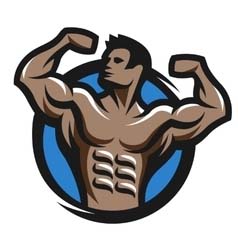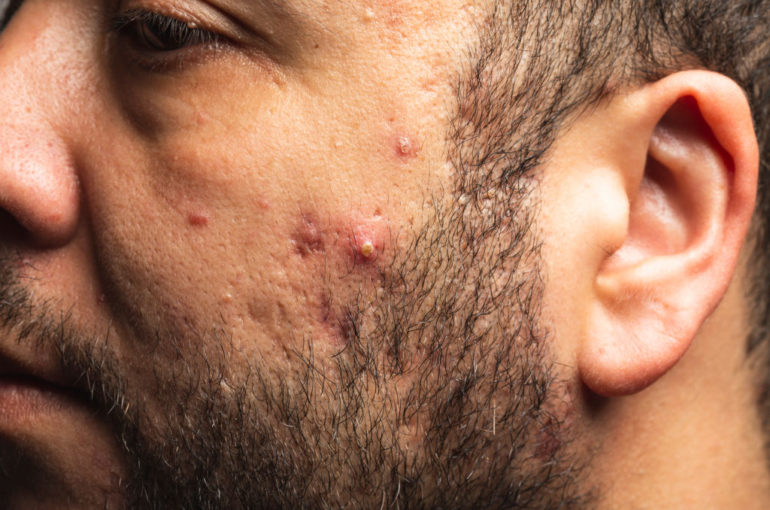How To Reduce Steroid Acne
When people use steroids, especially anabolics, the aim of their use is to improve the functioning and look of their body. However, when side effects such as acne occur as a result of steroid use, this defeats the purpose of creating an attractive appearance. Below, we will look at the reasons for steroid acne, what you can take to reduce its occurrence and where to buy these skin treatments at cheap prices in the USA to achieve perfectly clear skin that we all dream of.
Steroid acne
Acne is most often caused by an inflammation of the oil glands in your skin and hair roots. Acne vulgaris is the medical word for the ailment, however, it is more often referred to as pimples, spots, or zits by the general public and dermatologists. An acne-causing bacteria known as Propionibacterium acnes is responsible for the inflammation of the oil glands, which is also responsible for other disorders.
It is practically impossible to distinguish between the symptoms of steroid acne and those of conventional acne. In the case of steroid acne, on the other hand, it is systemic steroid use that makes the oil glands (sebaceous glands) more susceptible to infection and swelling. It is possible that prescription medications such as prednisone, as well as bodybuilding formulations, will be responsible for the production of acne.
The yeast infection in the hair follicles and the yeast infection in the skin are both responsible for the development of another type of acne known as Malassezia folliculitis or fungal acne. Malassezia folliculitis is also responsible for the development of another type of acne known as fungal acne. It is similar to acne vulgaris in that it may develop spontaneously or as a result of steroid use, either orally or intravenously, and that it can affect both the face and the body.
Despite the fact that both ordinary and steroid acne are most often linked with adolescence, they may occur at any time in one’s life.
It is important to distinguish steroid acne from steroid rosacea, which is a skin disorder produced by the repeated use of topical corticosteroids.
What are the signs and symptoms?
The most common location for steroid acne is the chest. It is fortunate that there are various effective methods for treating chest acne.
It may also be found on the face, neck, back, and arms, among other places.
Symptoms may include any of the following:
- Blackheads and whiteheads that are open and closed (comedones)
- Lumps on the skin that are tiny and red (papules)
- Spots of white or yellow color (pustules)
- Huge, painful red bumps on the skin (nodules)
- Cyst-like enlargements (pseudocysts)
You may also have secondary symptoms as a result of picking or scratching at your acne problem. These may include the following:
- Red markings on the skin from freshly healed wounds
- Scars left by previous spots that are black in color
If the steroid acne is of the acne vulgaris kind, the spots may be more uniform in appearance than they would be in the case of conventional, non-steroid acne.
If the steroid acne is caused by a fungal infection (Malassezia folliculitis), the majority of the acne spots will be the same size as one another. Comedones (whiteheads and blackheads) are not often seen on the skin.
What are the causes?
For people who have used steroids for an extended length of time, steroid acne is a prevalent skin problem that affects them more than anybody else.
Any time a person begins to take steroid medication for any reason, the body immediately begins to produce more androgen hormones, which frequently result in acne breakouts and other side effects.
How does it happen?
Researchers are still trying to figure out precisely how steroids boost your chances of acquiring acne. Several studies have shown that steroids may contribute to your body’s creation of TLR2 immune system receptors, which are important in the defense against infection. It is possible that the TLR2 receptors, in conjunction with the presence of the bacteria Propionibacterium acnes, contribute to the onset of an acne eruption.
Medication
Steroid acne therapy is similar to the treatment of ordinary acne (acne vulgaris), in that it entails the use of a variety of topical skin treatments and oral antibiotics.
Steroid-induced fungal acne (Malassezia folliculitis) is treated with topical antifungals, such as ketoconazole shampoo, or oral antifungals, such as itraconazole, which are both antifungal medications.
Antibiotics used orally
Severe and some mild instances of steroid acne, as well as any case with scarring, are treated with oral antibiotics. The antibiotics of the tetracycline class are the most effective for acne. This includes any product containing Doxycycline, such as Doxee Best by Alto Healthcare. However, other antibiotic types can be used to treat acne, such as Amoxicillin (Megamentin by Intas Pharmaceuticals or Vemox by Zee Drugs) and Azithromycin (Azab by Parth Laboratories or Azisign by HAB Pharmaceuticals).
They destroy the bacteria that cause acne and may also have some anti-inflammatory qualities, depending on the specific antibiotic. It might take anywhere from four to eight weeks of consistent antibiotic therapy before you see any improvement in your skin. It may take three to six months to completely clear your skin.
People of color are more prone to acne scarring and may be recommended to take oral antibiotics, even if they only have a minor case of skin condition.
Benzoyl peroxide
Benzoyl peroxide is a very efficient antiseptic that aids in the killing of acne germs as well as the reduction of inflammation. It is indicated for use in conjunction with oral antibiotics, as well as in mild instances that do not need the use of antibiotics.
Many over-the-counter acne remedies include benzoyl peroxide, which is a powerful acne therapy. It is occasionally used in conjunction with salicylic acid.
When applying any topical treatment to your face, it is crucial to make sure that you cover your whole face rather than just the areas that are visible. This is due to the fact that acne arises from microscopically tiny places on your face that are not visible to the naked eye.
When washing or applying medicine to your face, avoid scrubbing too hard, since this might worsen an acne problem even more.
Phototherapy
When it comes to treating acne, there is some evidence to support the use of phototherapy with blue and blue-red light.
Retinoids
It is possible that your acne case may be too severe for oral antibiotics, and will instead need the use of a form of skin treatment called a retinoid. Retinoids are tablets, creams, lotions, and gels that contain vitamin A as their active ingredient. However, the medication is much more effective when taken orally. The most effective oral retinoid is a substance called Isotretinoin, which is taken when other treatments, such as antibiotics, have failed to treat a person’s acne.
These are some examples of Isotretinoin products:
Accufine produced by Healing Pharma, Accutane by Dragon Pharma and Tretizen by Zen Labs.
Conclusion
Steroid acne is an annoying consequence of steroid use. But, once you have found the right treatment for your specific type of acne, this condition is easily curable. If you are suffering from steroid acne yourself and are interested in buying treatment online at an affordable price, feel free to visit Our Online USA Steroid Store. We stock various skin care products that have been proven to be the most effective treatment for all types of acne, specifically from steroid use.
If you are unsure which product to buy, you can even contact our customer service team and they will help you to determine the best treatment for yourself. Then, no matter where you are in America, we can deliver it to you straight away with guaranteed delivery.











